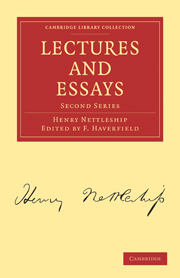Book contents
- Frontmatter
- PREFACE
- Contents
- Dedication
- MEMOIR BY MRS. NETTLESHIP
- I JOHAN NICOLAI MADVIG
- II THE ORIGINAL FORM OF THE ROMAN SATURA
- III LITERARY CRITICISM IN LATIN ANTIQUITY
- IV THE HISTORICAL DEVELOPMENT OF CLASSICAL LATIN PROSE
- V LIFE AND POEMS OF JUVENAL
- VI THE STUDY OF LATIN GRAMMAR AMONG THE ROMANS IN THE FIRST CENTURY A. D.
- VII ON THE PRESENT RELATIONS BETWEEN CLASSICAL RESEARCH AND CLASSICAL EDUCATION IN ENGLAND
- VIII THE MORAL INFLUENCE OF LITERATURE
- IX CLASSICAL EDUCATION IN THE PAST AND AT PRESENT
- X AUTHORITY IN THE SPHERE OF CONDUCT AND INTELLECT
- XI THE RELATIONS BETWEEN NATURAL SCIENCE AND LITERATURE
- BIBLIOGRAPHY
- INDEX
III - LITERARY CRITICISM IN LATIN ANTIQUITY
Published online by Cambridge University Press: 05 October 2010
- Frontmatter
- PREFACE
- Contents
- Dedication
- MEMOIR BY MRS. NETTLESHIP
- I JOHAN NICOLAI MADVIG
- II THE ORIGINAL FORM OF THE ROMAN SATURA
- III LITERARY CRITICISM IN LATIN ANTIQUITY
- IV THE HISTORICAL DEVELOPMENT OF CLASSICAL LATIN PROSE
- V LIFE AND POEMS OF JUVENAL
- VI THE STUDY OF LATIN GRAMMAR AMONG THE ROMANS IN THE FIRST CENTURY A. D.
- VII ON THE PRESENT RELATIONS BETWEEN CLASSICAL RESEARCH AND CLASSICAL EDUCATION IN ENGLAND
- VIII THE MORAL INFLUENCE OF LITERATURE
- IX CLASSICAL EDUCATION IN THE PAST AND AT PRESENT
- X AUTHORITY IN THE SPHERE OF CONDUCT AND INTELLECT
- XI THE RELATIONS BETWEEN NATURAL SCIENCE AND LITERATURE
- BIBLIOGRAPHY
- INDEX
Summary
It may be said in general that two main lines of literary criticism may be distinguished in ancient as in modern times. The first is the criticism of philosophy, which investigates the principles of beauty, regards art and literature alike as manifestations of the human spirit at the utmost height of its effort, and judges of literary and artistic productions according as they approach the realization of their intention. The second is the isolated and spontaneous judgement of artists and men of letters, sometimes accidental, occasional, and fragmentary, sometimes regularly formulated, but never rising beyond the point attained by the personal impressions of the critic.
In the wealth of ancient and modern literature it is no doubt easy to find instances of critics who may be said to unite both points of view. Much of Ruskin's criticism, for instance, may be called philosophical, as based upon thought, not indeed consistent and articulate, but still genuine; while much again is the utterance of personal intuition. Still, on the whole, the distinction may be maintained. Every one feels the difference (say) between Landor, Carlyle, and Matthew Arnold on the one hand, and Mr. Frederic Harrison on the other. Mr. Harrison, in writing of literature, never loses sight of the Comtist tradition. Mr. Arnold writes with sure literary instinct, but without reference to any definite system, unless indeed he may be said to have built up, bit by bit, a literary system of his own.
- Type
- Chapter
- Information
- Lectures and EssaysSecond Series, pp. 44 - 92Publisher: Cambridge University PressPrint publication year: 2010First published in: 1895

